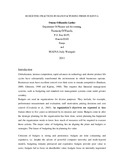Budgeting practices in manufacturing firms in Kenya

View/
Date
2011Author
Otieno, Luther O
Maina, Judy W
Type
OtherLanguage
enMetadata
Show full item recordAbstract
Globalization, intense competition, rapid advances in technology and shorter product life
cycles have substantially transformed the environment in which businesses operate.
Businesses must have excellent control over their costs to remain competitive (Banham,
2000; Johnston, 1990 and Kaplan, 1988). This requires that financial management
systems, such as budgeting and standard cost management systems come under greater
scrutiny.
Budgets are used in organizations for diverse purposes. They include, for example,
performance measurement and evaluation, staff motivation, pricing decisions and cost
control (Covaleski et al., 2003). An organization’s objectives are expressed in time
frames (three to five years) as informed by its mission and vision. Budgets come in after
the strategic planning for the organization has been done, action planning has happened
and the organization needs to know how much of resources will be required to execute
those actions. The major value of budgeting lies in aligning the plans and budgets to
strategies. The future of budgeting lies in planning for value.
Criticism of budgets is strong and persistence. budgets are time consuming and
expensive, i.e. despite the advent of powerful computer networks and multi-layered
models, budgeting remains protracted and expensive; budgets provide poor value to
users; budgets fail to focus on shareholder value; budgets focus on internally negotiated
targets which tend to be incremental changes from the previous period's outcomes;
budgets are too rigid and prevent fast response; budgets protect rather than reduce costs,
“use it or lose it" is the manager's mantra; budgets stifle product and strategy innovation,
"Never take risks." It is just not worth it; If it's not in the budget, you might be exposed;
Budgets focus on sales targets rather than customer satisfaction; and that budgets lead to
unethical behavior i.e. managing the results (also known as cooking the books) is a
frequent outcome of budgeting. Many finance managers are well versed in "managing the
slack" and feeding it into the results when needed (http://www.bbrt.org/bbconcept.htm,
accessed 24th April 2008)
Citation
Budgeting practices in manufacturing firms in KenyaPublisher
School of Business Department Of Finance and Accounting
Collections
- School of Business [175]
